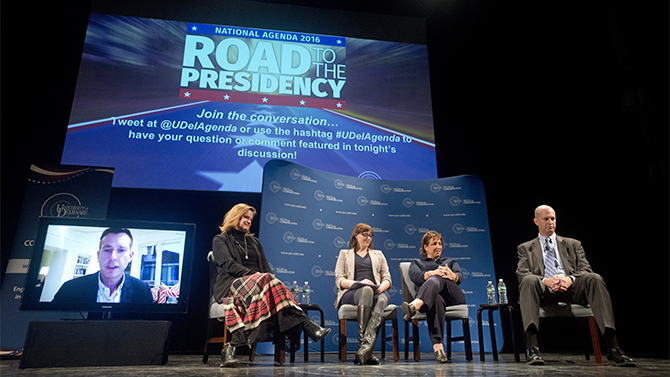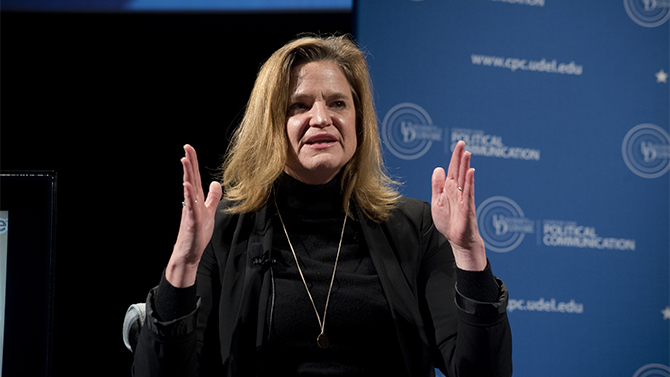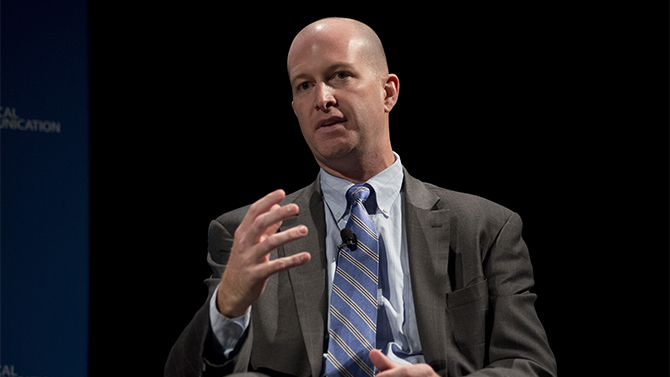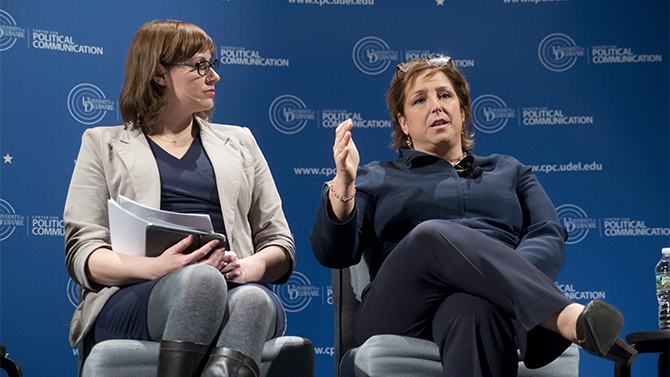

Election defied predictions
Photos by Duane Perry November 18, 2016
Election results surprised nearly all political experts, panelists say
A bipartisan panel of top political strategists, including Hillary Clinton’s communications director, told an audience at the University of Delaware that the 2016 presidential election — with results that shocked most experts — may have been decided in the final few weeks of the campaign.
“A lot of us, including myself, were really wrong about this election,” said David Plouffe, the UD alumnus who ran Barack Obama’s 2008 and 2012 presidential campaigns and had projected a Clinton victory over Donald Trump. He took part in the panel via Skype.
The election should make all political professionals and pundits wary of making predictions, Plouffe said. Still, he told the National Agenda "Road to the Presidency" speaker series audience in Mitchell Hall on Wednesday, Nov. 16, that if the election had been held immediately after the third presidential debate, he believes the outcome would have been different.
Jennifer Palmieri, communications director for Hillary for America, agreed that Trump gained support in the final two or three weeks of the campaign. She said support for Clinton grew after each of the three debates, attributing those gains to the fact that the debates were the only opportunity for voters to see Clinton “unfiltered” and side-by-side with her opponent.
“We should have called for a fourth debate” to be held about a week before the election, Palmieri said. “It would have been very unconventional” as a tactic but could have been highly effective.
Instead, she said, in the weeks after the final debate on Oct. 19, the presidential campaign again became dominated by Trump’s frequently provocative statements at rallies and on Twitter, with news coverage of Clinton often restricted to her reactions to those Trump comments.
Panelist Chris Russell, a Republican political strategist who has worked with local, state legislative and congressional candidates in New Jersey and other states, called Trump’s ability to dominate the news “masterful.”
“He used Twitter to begin and end every news cycle by himself,” Russell said. If the media was focusing on a negative story about Trump, he said, the candidate would tweet a controversial message on a different topic and change the next day’s headlines.
Russell agreed that the election seemed to turn in its final days. He attributed that to the fact that voters who remained undecided almost until the last minute ended up voting disproportionately for Trump.
If any of Trump’s campaign comments that offended many people failed to turn the “late undecided” voters against him at the time, Russell said, then that particular group was unlikely to become anti-Trump in the voting booth.
“If you were still there at the end, then you weren’t voting on those things,” he said.
Trump’s use of provocative statements and tweets was an effective use of the latest technology in campaigning, said Kim Alfano, president and CEO of Alfano Communications and a leading Republican media strategist.
“His style is an entertainer’s style” rather than one of a traditional political candidate, Alfano said. Trump made “extreme and exciting statements” almost every day, attracting attention even if he later softened some of those stances.
In the end, Alfano said, he connected directly with voters, as if he were having a personal conversation with them.
"He's tapped into a world of people that don't watch cable news all day or that don't read the newspapers cover to cover,” she said.
Plouffe said he had underestimated “the power of Trump’s message, the breadth of his appeal and his ceiling,” or the maximum voter support possible, which Plouffe had thought was 45 percent.
A detailed analysis of individual voter behavior won’t be possible until precinct-by-precinct numbers are available, which Plouffe said could take another six months. The polls and voter data analysis leading up to the election missed the mark in some ways, he said, and experts will be reviewing the numbers for a long time to come.
“When your models are right, you make great decisions in a campaign,” Plouffe said. “In this case, all of the models were wrong,” including those used by the Trump and other Republican campaigns.
Russell agreed that for most of the campaign, he and fellow Republicans “were just hoping to hang on” to congressional seats and were not optimistic about Trump’s chances. A month before Election Day things felt “bleak,” he said, but he sensed a shift in the final couple of weeks.
Palmieri noted that Clinton won the popular vote but that some states the campaign had expected to win, such as Pennsylvania, Michigan and Wisconsin, went for Trump and gave him the win in the Electoral College. The campaign, she said, failed to re-create the Obama coalition he mobilized in 2008 and 2012.
“At the end of the day, more people voted for her [than for Trump] but not in the right places,” Palmieri said.
Plouffe said Clinton may have had a problem with turnout, but he also cited her higher popular vote and the relatively small shifts in voter behavior that could have changed the result. He said he is eager to see final data from all precincts.
“You move 80-90,000 votes around [geographically], and you’d be talking about President-elect Clinton,” he said.
About the National Agenda speaker series
The “Election Aftermath” panel discussion was the final event in the 2016 National Agenda speaker series, which this year focused on the presidential campaign.
National Agenda 2017 is expected to be held next fall semester. All events in the series are free and open to the public and are designed to encompass a wide variety of points of view.
The director of the National Agenda series is Lindsay Hoffman, associate professor of communication and associate director of UD’s Center for Political Communication (CPC).
National Agenda was established by Ralph J. Begleiter, former CNN world affairs correspondent and professor in the Department of Communication, who created and was the first director of the CPC. Through the years, the series has looked at a range of key American political issues, from corporate influence to the growing importance of digital campaigns.
National Agenda 2016 was supported by the William P. Frank Foundation of Delaware and UD’s College of Arts and Sciences and Office of the Provost.
Contact Us
Have a UDaily story idea?
Contact us at ocm@udel.edu
Members of the press
Contact us at 302-831-NEWS or visit the Media Relations website





